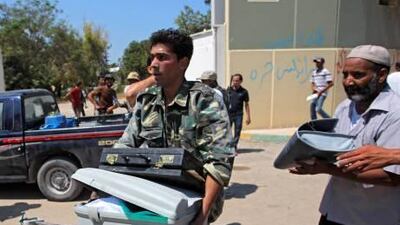Libya's jubilant National Transitional Council was last night expecting a significant boost as its international allies met in Qatar to raise emergency funds for the post-Qaddafi government-in-waiting.
The immediate target was to raise $2.5 billion(Dh9.1bn) to pay the salaries of public workers and treatment of those injured in the six-month-old fighting.
The meeting came as France, Britain and the United States were working on a UN Security Council resolution to release tens of billions of frozen Libyan assets to help the transition to democracy. A vote could take place later this week.
"The assets that have been frozen for five months… ultimately belong to the Libyan people," Britain's foreign secretary, William Hague, said.
Doha was a fitting host for yesterday's aid conference that brought together representatives from the United States, France, Italy, Britain, Turkey, Qatar and the United Arab Emirates.
Qatar, a major base for rebel Libyan leaders, was the first Arab country to contribute planes to police the UN-mandated and Arab League-backed no-fly zones, led by Nato, over Col Muammar Qaddafi's Libya.
The UAE also joined the operation while both countries provided critical aid and diplomatic support to Libya's opposition fighters.
The Arab world, from the marbled palaces of its leaders to the street, has been unanimous in celebrating the downfall of Qaddafi, who was reviled across the region.
The Libyan rebels' Gulf allies are now set to become wealthy patrons of Libya's reconstruction in what would mark another step in the region's transformation from a political bystander to a front-line player.
The National Transitional Council (NTC) has huge goodwill towards the UAE and Qatar that is expected to translate into a bonanza of new business ties.
"They are well poised to play a big role in Libya," said Shadi Hamid of the Brookings Doha Centre in Qatar. "Part of their strategic calculation in having a role in the military operations was that they stood to benefit in post-Qaddafi Libya."
With Africa's largest proven oil reserves and a population of just 6.4 million, Libya is as potentially rich as any Gulf nation.
A new Libyan government is also expected to reward Western companies and investors, while China, Russia and Brazil, which opposed tough sanctions on Col Qaddafi, are likely to lose out.
Libya's debt-free government has more than $150bn in funds frozen abroad, the NTC says.
Libya's invaluable oil sector could take months to re-boot. Production has fallen from 1.6 million barrels a day to fewer than 100,000.
By some estimates, the conflict inflicted as much as $15bn of damage on the Libyan economy, which badly needs reforming after Col Qaddafi's whimsical and corrupt rule. A functioning government, security and political stability will also be needed for business to return.
But working in Libya's favour is that many members of the old regime are part of the NTC. Their involvement means that economic and political institutions are likely to begin functioning sooner than they did in Iraq after the 2003 US-led invasion, when Saddam Hussein's Baath Party elite were removed en masse.
Jane Kinninmont, a Mideast expert at Chatham House, a leading London-based think tank, said: "It's quite possible you could see Qatar Petroleum or one of the UAE firms getting involved on the marketing side" of Libyan oil.
The Gulf's other showcase industries, from airlines and port operation to construction - also could be in high demand in Libya, she added.
Dubai-based DP World is the world's third-largest seaport operator, and airlines Emirates, Etihad and Qatar Airways are counted among leading brands.
"The property developers who've been able to build attractive hotels out of nothing in the deserts of the Gulf are also going to look favourably on the deserts of Libya," Ms Kinninmont told the Associated Press.
The US has $37bn in frozen Libyan money, while Britain blocked $20bn and Germany holds $10.5bn.
Washington is working "urgently" to release about $1.5bn in liquid assets to the NTC for humanitarian purposes and to "help it establish a secure, stable government", Victoria Nuland, the US State Department spokeswoman, said on Tuesday.
Expressing confidence in the NTC's probity, she added: "We would not have taken this step if we didn't have confidence that the money would get to the people who need it."
European Union countries are also preparing to unfreeze Libyan assets once they get the UN's green light. "Libya is a rich country. The question is how to get the economy moving again quickly," Catherine Ashton, the EU's foreign policy chief, said this week.
Farhat Bengdara, Libya's former Central Bank governor, who broke with Col Qaddafi's regime in February, said: "We don't need loans. Libya has huge financial resources and oil reserves. What it needs is the cooperation of the international community to lift the freeze on Libya's assets abroad."
mtheodoulou@thenational.ae

